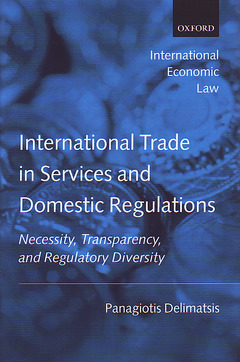Description
International Trade in Services and Domestic Regulations
Necessity, Transparency, and Regulatory Diversity
International Economic Law Series
Author: Delimatsis Panagiotis
Language: English
Subjects for International Trade in Services and Domestic Regulations:
Publication date: 12-2007
366 p. · 16.4x24.1 cm · Hardback
366 p. · 16.4x24.1 cm · Hardback
Description
/li>Contents
/li>Biography
/li>
In 2005 the WTO Appellate body ruled that the United States' total prohibition on cross border gambling services was unlawful under the General Agreement on Trade in Services (GATS). The questions raised by the case - whether and how a Government could block service provision on moral grounds - went to the heart of key controversies surrounding international economic law. How do you reconcile a liberal system of international trade in services with national governments' desire to protect social values through service regulation? How much control are the WTO members willing to transfer to the WTO? How much regulatory diversity can the international trading system withstand? This book provides a comprehensive analysis of the regulation of services under the WTO's GATS Agreement. Through a thorough examination of the GATS negotiation history, substantive provisions, judicial interpretation, and ongoing reform process, the book presents a clear picture of how the multilateral trading system justifies and tolerates regulatory diversity. In this respect, the book focuses on the core general principles of necessity and transparency, which would allow the assessment of the consistency with the GATS of domestic regulations in services at a horizontal, cross-sectoral level. In addition, the book reviews with a critical eye the ongoing GATS negotiations on the creation of rules on domestic regulations.
I. The Multilateral Legal Framework Governing Trade in Services. A. The Uruguay Round: a rules-based system for world trade. B. The position of services in world trade. C. Creating the GATS. D. The position of the GATS in the GATT/WTO structure - The boundaries between the GATT and the GATS. E. The GATS at a glance. F. Dancing in the dark? The GATS' tentative steps towards. II. Barriers to Trade in Services. A. Introductory remarks. B. Usual barriers to trade. C. Protection in services industries. D. Regulations as impediments to trade in services. E. Typologies of barriers to trade in services. F. Possible gains from dismantling barriers to trade in services. III. Domestic Regulation and the GATS. A. Introductory remarks. B. Snipping at the Gordian Knot of domestic regulation. C. The obligation contained in Article VI GATS. D. The Relationship of Article VI with Atyicles XVI, XVII, and XVIII - A Conciliatory Approach. E. To regulate, or not to regulate? That is the question-But not the only one: A primer on the tools for evaluating the domestic regulatory regime. F. Put the blame on the GATS: liberalization, deregulation, regulatory reform...or something else?. IV. Creating a Horizontal Necessity Test for Services. A. Introductory remarks. B. The establishment of the WPPS and the development of disciplines on domestic regulation with respect to accountancy services. C. The Establishment of the WPDR. D. Towards the development of a horizontal necessity test applicable to all service sectors. E. The Prospects of, and some essential elements for, a horizontal necessity test. V. Transparency and Domestic Regulations in Services. A. Introductory remarks. B. Transparency as a general principle of WTO law. C. The principle of transparency in the GATS. D. The issue of transparency as discussed in the WPDR. E. Horizontally applicable transparency disciplines and the linkage with necessity. Concluding Remarks: Challenges for the Future. Ic Bibliography.
Panagiotis Delimatsis is Senior Research Fellow at the World Trade Institute, University of Berne, Switzerland. Previously he has worked at the WTO Appellate Body secretariat, UNCTAD, and practised law in Greece.
© 2024 LAVOISIER S.A.S.




